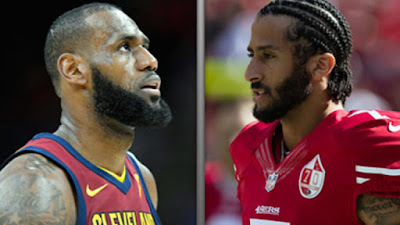At the risk of stating the obvious or rehashing ground that
many others have covered far more eloquently than I will, I feel compelled to
call out a double standard in our attitude towards socially engaged black
athletes. When he calls attention to the
plight of black people in this country, LeBron James is told to “shut up and
dribble,” never mind that white athletes (and actors and musicians) are lauded for
their charitable and humanitarian efforts.
When black NFL players kneel or otherwise use the playing of the
national anthem to raise awareness of how black people are treated in our
criminal justice system, people cry that a football game is not the time for
social causes, never mind that any given week brings massive campaigns for
things like breast cancer or pediatric research or childhood obesity.
Not sure if the pushback is the color of the messengers or
the predominant color of the people they are fighting for (more on this in a
sec), but either way the message is clear: a very large proportion of American
sports fans are anywhere from apathetic to hostile when it comes to black
athletes raising black issues.
It is easy to draw a direct line to the minstrel shows of
yesteryear, and even further back to the hugely attended battles between
Christians and lions for sport in ancient Rome.
We have relegated the black athlete to entertainer, with no regard to
his own wellbeing, his opinions, or his advocacy for others. The implicit message behind “shut up and
dribble,” after all, is “because you’re no good for anything but to entertain
us with your athletic exploits.”
To return to a question raised above, I actually think more
of the pushback is towards the message and not the messenger. Recall that Tiger Woods, and Michael Jordan
before him, was lauded not only for his sporting dominance but for representing
a broader image of success and professionalism.
Tiger (and MJ before him) could sell watches and cars and even
consulting firms, because we were comfortable seeing this particular type of black
athlete as a proxy for success and professionalism. Importantly and famously, both Tiger and MJ
were apolitical, particularly about issues of race. So we had no problem elevating these two,
because though they were black athletes they didn’t use their fame to raise
issues that made us uncomfortable. (If I
may offer a slight and tangential counterpoint here, which is that Allen
Iverson was also fairly apolitical, and yet never got the same love as Tiger or
MJ because his physical appearance and general demeanor didn’t reconcile with
peoples’ sense of success and professionalism.
Indeed, AI made some people feel downright uncomfortable. So, going back to my previous question, I
think it’s both.)
Much of America is less comfortable with Colin Kaepernick
and with the version of LeBron James that is vocal on race issues in America,
because it reminds them that all too many people in this country who look like
Kaepernick and James but who don’t throw a football or dunk a basketball for a
living are discriminated against simply for the color of their skin. We are a post-slavery society that wants to
be a post-racial society, but that hasn’t yet fully dealt with either the
trauma inflicted upon African-Americans as a result of being owned and abused,
or the insidious prejudices that a segregated and unjust co-existence have
nurtured in the rest of us. We want
James to stick to hoops, and to think that Kaepernick not being signed to a
team has anything to do with his protests, because we are unwilling to accept
either the continued racism that exists in our nation or our participation in
that racism.
You can disagree with the positions black athletes take on
social issues. But if you disagree with
their freedom to use the platform their fame has provided them to speak out on
issues, and take umbrage with their audacity to stand (or kneel) in solidarity with
people who look like them, shame on you.



No comments:
Post a Comment